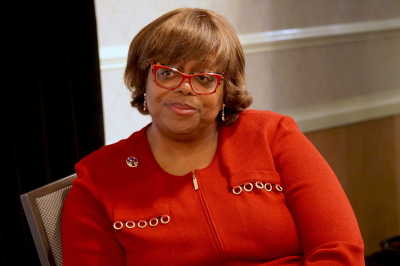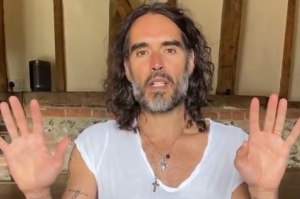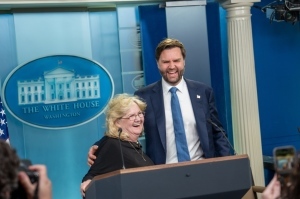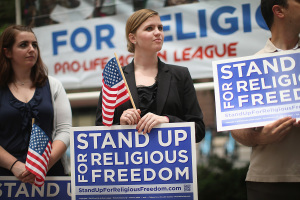Former DNC chair says 'religion must not be used as a cudgel to discriminate' at IRF Summit

WASHINGTON — While the International Religious Freedom Summit featured bipartisan agreement about the importance of religious freedom at a time when political polarization has engulfed nearly every aspect of American life, remarks made by a prominent Democrat at the conference indicate that partisan divides persist in the debate surrounding the intersection of LGBT nondiscrimination laws and religious liberty.
Rep. Debbie Wasserman Schultz, D-Fla., who served as the chair of the Democratic National Committee from 2011 to 2016, addressed the annual gathering of religious freedom advocates at the Washington Hilton Wednesday.
Serving as the honorary congressional co-chair of this year’s IRF Summit, she spoke about the importance of her Jewish faith in shaping her values and motivating her to run for public office. But at the same time, she insisted that “Although my Jewish heritage shapes my values, I firmly believe in the separation of church and state, especially here in the U.S.”
“Sadly, many have sought to impose their beliefs on others or abuse religious freedoms to justify oppression or prejudice against religious minorities and other marginalized groups, including LGBTQI+ individuals,” she added. “Religion must not be used as a cudgel to discriminate against others.”
Wasserman-Schultz’s remarks reflect a divide on the topic of religious liberty and conscience rights. As many state and local governments have embraced policies that ban discrimination based on sexual orientation and gender identity, faith-based organizations and individuals with deeply held religious beliefs about marriage and sexuality have found themselves in court facing allegations of discrimination.
On this particular issue, Democrats often come out in favor of the nondiscrimination measures, while Republicans generally side with conscience protections for religious individuals and faith-based organizations.
The U.S. Supreme Court ruled in 303 Creative LLC v. Elenis that the state of Colorado could not use state civil rights laws to force a Christian website designer to make websites for same-sex weddings. Similarly, the court determined in the unanimous Fulton v. City of Philadelphia decision that the city of Philadelphia could not exclude Catholic Social Services from its foster care program due to its objection to placing children with same-sex couples.
Both Wasserman-Schultz and House Speaker Mike Johnson, R-La., touched upon the topic of conscience in their speeches at the IRF Summit Wednesday.
“The United States can and should serve always as an emblem of freedom of conscience,” Wasserman-Schultz said.
Johnson, a conservative Baptist, quoted from James Madison, who described “conscience” as “the most sacred of all property.”
The House speaker stated that based on this line of thinking, “if governments shouldn’t steal your property, then they shouldn’t steal your conscience.” He also insisted that governments “shouldn’t prohibit you from acting upon it.”

In an interview with The Christian Post, former U.S. Ambassador-at-Large for International Religious Freedom Suzan Johnson Cook, who served from 2011 to 2013 during the Obama administration, reacted to Wasserman-Schultz’s comments and the counterargument that people who have deeply held beliefs about marriage and sexuality should not be forced to violate them.
She stressed, "Our First Amendment here gives us the right of expression and the right to worship.” Cook told CP that she did not hear Wasserman Schultz’s comments but appeared to agree with them to some degree.
“Many people find an issue and they pull it under religious freedom, and then they attack people,” she asserted. “I can’t tell [people] whom to love or how to love or how to live.”
Ryan Foley is a reporter for The Christian Post. He can be reached at: ryan.foley@christianpost.com





























